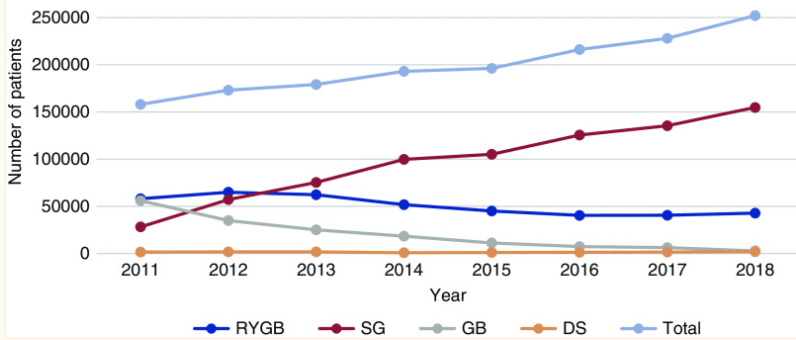Kidney stones after gastric bypass may occur. Learn what changes in urine composition can be expected. Suggest these dietary recommendations to reduce the risk of calcium oxalate stones.
A 31-year-old morbidly obese male is evaluated in the nephrology clinic prior to a planned gastric bypass. The patient has a history of calcium oxalate stones. The bariatric service would like guidance on whether to perform the Roux-en-Y anastomosis or gastric sleeve to mitigate the risk for calcium oxalate stones post bypass.
The patient has undergone evaluations for kidney stones in the past and has remained stone-free for 2 years, taking Urocit-K and increasing his fluid intake throughout the day. He produces 2.5 liters of urine daily, and his other parameters, including calcium, oxalate, citrate, and sodium, are within an acceptable range.
More bariatric surgery procedures in the United States over time.
Includes Roux-en-Y gastric bypass (RYGB) and sleeve gastrectomy (SG). RYGB can lead to kidney stones after gastric bypass.

Please answer the following questions:
The gastric sleeve procedure to avoid calcium oxalate kidney stones after gastric bypass surgery.
Patients who receive a Roux-en-Y anastomosis can have an increased absorption of oxalate, with decreased citrate absorption, resulting in more calcium oxalate stones.
Kidney-stone risk has not been linked to restrictive bariatric surgeries like the gastric sleeve.
The most common bariatric surgical procedures in the United States are Roux-en-Y gastric bypass (RYGB) and sleeve gastrectomy (SG).
Bariatric surgery, particularly malabsorptive procedures like Roux-en-Y gastric bypass, is associated with an increased risk of kidney stones.
Bariatric surgery alters nutrient absorption and can lead to changes in urine composition, such as increased oxalate levels. This shift may promote the formation of kidney stones. Additionally, rapid weight loss and dehydration post-surgery can further contribute to stone development, necessitating careful monitoring.
Malabsorptive bariatric surgeries, such as Roux-en-Y gastric bypass, are associated with an increased risk of kidney stones, while restrictive surgeries like gastric sleeve do not show this association.
Patients should avoid high-oxalate foods, consume the daily recommended amount of dietary calcium, and time calcium supplement intake with food.
Dietary management post-bariatric surgery is crucial for kidney stone prevention. High-oxalate foods can increase stone formation, while adequate calcium intake helps bind oxalates in the gut, reducing absorption. Timing calcium with meals enhances its effectiveness and minimizes potential stone risk. These strategies decrease stone after gastric bypass.
Adequate dietary calcium and taking supplemental calcium with food may lower urine-oxalate levels because calcium binds with dietary oxalate in the gut, forming an unabsorbed oxalate-calcium complex that is excreted.
Hyperoxaluria is a condition characterized by high levels of oxalate in the urine, which can be influenced by dietary choices, particularly the intake of high-oxalate foods.
Potassium citrate has been shown to increase urine citrate and decrease bone resorption, making it a potential therapeutic option for patients after RYGB surgery.
Increased fluid intake is recommended to help dilute urine and reduce the concentration of substances that can form stones.
Learn More:
Oxalate Content in Food, Patient Information for Calcium Oxalate Stone Formers by Michael Aaronson MD, Lincoln Nephrology and Hypertension
Using The Number Needed To…
Best Way To Prevent Contrast…
Go to the Top


